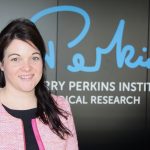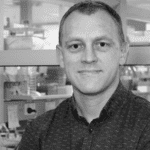Office Bearers

Gina Ravenscroft
President
Dr Gina Ravenscroft is a NHMRC Career Development Fellow at UWA and the Harry Perkins Institute of Medical Research. She completed her undergraduate and postgraduate studies at the University of Western Australia, with a focus on muscle physiology and genetics. Her research focuses on identifying novel human disease genes for severe neuromuscular diseases and understanding how gene mutations cause disease. The research team is also focused on prevention of severe genetic diseases and is researching the implementation of pre-conception carrier screening in WA. Gina receives funding from the NHMRC, the French Muscular Dystrophy Association (AFM), A Foundation Building Strength for Nemaline Myopathy and the WA Department of Health. Gina was awarded a WA Young Tall Poppy Award and the World Muscle Society Young Myologist of the Year Award in 2016. She is an active member of the UWA Researchers’ Association and the Harry Perkins Institute Student and EMCR Mentoring committees and is passionate about promoting health and medical research to the broader community.

Frederic A. Meunier
Immediate Past President
Professor Frederic Meunier obtained his Masters degree in Neurophysiology at the Paris XI University, France in 1992 and completed his Ph.D in Neurobiology at the CNRS in Gif-sur-Yvette, France in 1996. He was the recipient of a European Biotechnology Fellowship and went on to postgraduate work at the Department of Biochemistry at Imperial College (1997-1999) and at Cancer Research UK (2000-2002) in London, UK. After a short sabbatical at the LMB-MRC in Cambridge (UK), he became a group leader at the School of Biomedical Sciences at the University of Queensland (Australia) in 2003. He joined the Queensland Brain Institute of the University of Queensland in 2007 and obtained an NHMRC senior research fellowship in 2009, which has been renewed in 2013 with promotion to full Professor. Since establishing his own laboratory, his research has received continuous funding from ARC Discovery, LIEF and NHMRC projects. He was also the recipient of a UQ Research Excellence Award for his work on phosphoinositides and secretion. He has established a strong international profile in the field of neurobiology over the last 20 years, with particular expertise in exocytosis, trafficking, Single molecule super-resolution microscopy, neurotoxins and synaptic plasticity. His lab has made important contributions to our understanding of how specific proteins and phosphoinositides dynamically interact to control vesicle priming and fusion with the plasma membrane. The overall goal of his research is to determine how brain cells communicate and survive in health and disease. His lab focuses on the molecular events governing vesicular trafficking within presynaptic nerve terminals and neurosecretory cells.

Anthony Hannan
Past President
Professor Anthony Hannan is an NHMRC Principal Research Fellow and Head of the Epigenetics and Neural Plasticity Laboratory, Florey Institute of Neuroscience and Mental Health, University of Melbourne. Prof. Hannan received his undergraduate training and PhD in neuroscience from the University of Sydney. He was then awarded a Nuffield Medical Fellowship at the University of Oxford, where he subsequently held other research positions before returning to Australia on an NHMRC RD Wright Career Development Fellowship to establish a laboratory at the Florey Institute. He subsequently won other fellowships and awards, including an ARC FT3 Future Fellowship, the British Council Eureka Prize, the International Society for Neurochemistry Young Lecturer Award and the Federation of European Biochemical Societies Anniversary Prize. Prof. Hannan and colleagues provided the first demonstration in any genetic animal model that environmental stimulation can be therapeutic. This has led to new insights into gene-environment interactions in various brain disorders, including Huntington’s disease, dementia, depression, schizophrenia and autism spectrum disorders. His research team at the Florey explore how genes and the environment combine via experience-dependent plasticity in the healthy and diseased brain. Their research includes models of specific neurological and psychiatric disorders which involve cognitive and affective dysfunction, investigated at behavioural, cellular and molecular levels so as to identify pathogenic mechanisms and novel therapeutic targets.

Robert Ramsay
Past President
Rob is the Group Leader of the Differentiation and Transcription Laboratory (since 1995) and Head of the Cancer Cell Biology Program at Peter MacCallum Cancer Centre. His PhD in Biochemistry was gained at the Queensland Institute for Medical Research. He did post-doctoral training at Memorial Sloan Kettering, New York and the Ludwig Institute, Melbourne and currently holds a National Health & Medical Research Council (NHMRC) Senior Research Fellowship Level B. He is a past President of the Australian Society for Medical Research (ASMR) and serves on a number of national and international medical research funding, judging and policy committees, teaches second and third year genetics at Latrobe University and co-ordinates an Oncology lecture series with other members of the Peter Mac research faculty for The University of Melbourne Pathology Department. During this time he has put a lot of his energy into early career development within and outside the NHMRC and has advocated the importance of mentoring young researchers at all levels within the medical research sector. In the past he has worked as the science advisor for a Biotechnology company working on cancer biomarkers over five years (2004-8). His research group’s interests span from epithelial stem cells in the context of colorectal and breast cancer, to neurogenesis, radiotherapy and genome instability. He is currently involved in clinical trials and the development of novel cancer therapies including DNA vaccines that target nuclear oncogenes.

Melanie White
Secretary and QLD State Representative
Dr Melanie White is an ARC Future Fellow and the head of the Dynamics of Morphogenesis lab at the Institute for Molecular Bioscience. She completed her PhD at University College London followed by postdoctoral research at The University of Edinburgh, Monash University and A*STAR in Singapore. Dr White uses quantitative live imaging to understand how embryos form and cells choose their fate. Her work has revealed key mechanisms driving the earliest morphogenetic events in embryogenesis and was published in Cell, Science, Nature Cell Biology and Nature Protocols. Dr White’s research has been featured on the cover of multiple journals including Cell and she was awarded the inaugural American Society for Cell Biology Porter Prize for Research Excellence. Currently, her lab focuses on performing live imaging of avian and human stem cell models to understand how the nervous system first forms.

Robert Medcalf
Past Secretary
Professor Robert Medcalf was awarded his Ph.D. from the University of Melbourne in 1984. His first post-doctoral appointment was at the University of Melbourne where he investigated the role of the plasminogen activating system in rheumatoid arthritis. In 1986, he continued his research in Lausanne, Switzerland where he extended his interest in the transcriptional regulation of the plasminogen activators and their inhibitors. In 1993, he returned to Australia where he established a laboratory in the Department of Medicine at Monash University in Melbourne and was a foundation member of the Australian Centre for Blood Diseases (ACBD). During this time he initiated a program of research investigating the role of the fibrinolytic system in the central nervous system and this is currently the most prominent research focus of his laboratory. He has a particular interest in understanding how the fibrinolytic protease, tissue type plasminogen activator (t-PA) potentiates neuronal injury and modulates blood brain barrier permeability and the influence of this in ischaemic stroke. His laboratory is also exploring the role of the fibrinolytic system in traumatic brain injury and in models of neurogeneration. He has published more than 110 papers in peer reviewed journals. He was appointed to the NHMRC Fellowship Scheme in 2003 (SRF-A) and was promoted to the level of Principle Research Fellow in 2012.

Stuart Pitson
Treasurer and SA State Representative
Prof Stuart Pitson gained his PhD at La Trobe University, and then undertook postdoctoral positions at Wageningen University in The Netherlands, and then the University of New South Wales. He then moved to Adelaide and began his current research interests in examining sphingolipid-mediated cell signalling pathways, and how they contribute to cancer and other diseases. He gained a RD Wright Early Career Fellowship from the NHMRC in 2003, and in 2008 he became a NHMRC Senior Research Fellow, which was renewed in 2013. His laboratory has expertise in cell signalling, enzymology, post-translational protein modifications, structure-based drug discovery, and cancer biology.

James Murphy
VIC State representative
James Murphy is a Leadership Fellow of the NHMRC and Head of the Inflammation Division at the Walter and Eliza Hall Institute of Medical Research. He completed his undergraduate studies in Christchurch, New Zealand, before completing his PhD studies at the Australian National University, Canberra, Australia in 2003. As a CJ Martin Fellow of the NHMRC, he completed postdoctoral training in the lab of the signalling guru, the late Tony Pawson (Toronto, Canada). He moved to the Walter and Eliza Hall Institute in 2007 and was appointed group leader in January 2015, Associate Professor in 2017 and Head of the Inflammation Division in 2019. His lab is focused on understanding the protein interactions that control cell signaling and how these interactions are perturbed in disease.

Elizabeth Gardiner
ACT Representative
Associate Professor Elizabeth Gardiner is an NHMRC Senior Research Fellow and Deputy Head of the Department of Cancer Biology and Therapeutics in the John Curtin School of Medical Research at ANU, Canberra, Australia. She is Scientific Head of the recently established National Platelet Referral and Research Centre at ANU and The Canberra Hospital. She has published more than 110 peer-reviewed research papers, commentaries and reviews in the area of platelet biochemistry and platelet function, particularly relevant to both thrombosis and bleeding in patients. She identified a novel mechanism for shedding of vascular receptors triggered by shear stress, enabling new capabilities in diagnostic and therapeutic reagent development.
She is a Trustee of THANZ, a Principal Editor and the Methods Editor of the journal Platelets and is Treasurer of the National Association of Research Fellows (NARF). She sits on the American Society of Hematology (ASH) Scientific Committee on Platelets. She has held executive roles on the International Society for Thrombosis and Haemostasis Vascular Biology Scientific Subcommittee, and the Australian Vascular Biology Society.

Herbert Herzog
NSW State Representative
Prof Herbert Herzog studied Chemistry, switching to Biochemistry for his PhD, which he obtained from the University of Innsbruck (Austria) in 1989. In 1991, he joined the Garvan Institute where he studies the role of NPY and other family members like PYY and pancreatic polypeptide, investigating the numerous different functions of these important molecules publishing over 280 articles on this topic.
Prof Herzog currently holds a NHMRC - Senior Principal Research Fellowship and is the Chair in Neuroendocrinology at the Garvan Institute in Sydney.
Prof Herzog’s current work focuses on determining the fundamental processes that can lead to the development of obesity, or the other extreme anorexia, especially investigating the brain's role in the regulation of eating behaviour, stress and glucose homeostasis. He is also interested in how homeostatic processes that regulate bodyweight are coordinated with other homeostatic processes in the body, like the one that control bone and fat mass and how this changes with age.

John Silke
VIC/TAS State Representative
Professor John Silke is an NHMRC Principal Research Fellow. He first completed a law degree in King's College, London, before seeing the error of his ways and obtaining a second degree in Biochemistry at Churchill College, Cambridge (1992). He completed a PhD in Zürich, Switzerland, with Prof. Walter Schaffner, looking at the role of DNA methylation in the regulation of transcription (1997). A Swiss fellowship allowed John to post-doc with Prof. David Vaux in the Walter and Eliza Hall Institute, Australia (1997-2005), where he focused on cell death mechanisms and in particular the role of Inhibitor of APoptosis proteins (IAPs) in regulating cell death. After a five-year stint running a lab in La Trobe University, Australia, he returned to the WEHI (2011). He has a strong interest in translational research and was a member of the Scientific Advisory Board of TetraLogic Pharmaceuticals Corporation for 5 years. In this capacity he has contributed to our understanding of how IAP antagonist drugs, now called Smac-mimetics, kill cancer cells and the development of a well tolerated Smac-mimetic, called birinapant. Smac-mimetics such as birinapant work to kill cancer cells by inducing inflammatory cytokines such as TNF and simultaneously sensitising cells to cell death induced by these cytokines. They are widely used together with TNF to induce necroptosis and John's lab has a keen interest in exploring the mechanisms and consequences of this newly recognised type of cell death.

Brett Collins
QLD State Representative
Associate Professor Brett Collins is an NHMRC Career Development Fellow and head of the Molecular Trafficking Lab at UQ's Institute for Molecular Bioscience. He was a lead investigator in the seminal structural studies of AP2, the protein adaptor molecule central to clathrin-mediated endocytosis, and has since defined the molecular basis for the function of critical proteins regulating membrane trafficking and signalling at the endosome organelle. His team is now focused on understanding how discrete molecular interactions between proteins and lipids control these processes in human cells. Associate Professor Collins was awarded his PhD in 2001 and has published over 75 papers including in Cell, Nature, Nature Structural and Molecular Biology, Developmental Cell, and The Proceedings of the National Academy of Sciences USA, altogether cited more than 3100 times. He is the recipient of 3 prestigious fellowships, including a previous Career Development Award from the National Health and Medical Research Council and a Future Fellowship from the Australian Research Council, and was awarded the University of Queensland Research Excellence Award in 2008. In 2015 he was awarded the Emerging Leader Award of the ANZSCDB and in 2016 the Merck Research Medal from the ASBMB. He is currently the President of the Queensland Protein Group.

Ryu Takechi
WA State Representative
Associate Professor Ryu Takechi is a Curtin Senior Research Fellow with a distinguished track record in research leadership and innovation. He has previously held prestigious fellowships, including the NHMRC Early Career Fellowship, Career Development Fellowship, Dementia Leadership Fellowship, and the WA Department of Health Innovation Fellowship.
Trained in nutritional biochemistry and vascular biology in Japan and Canada, Ryu moved to Australia to complete a PhD focused on dementia and cerebral microvascular research. His pioneering work combines animal models and clinical trials to uncover novel causes of dementia and develop effective therapies, including repurposing existing drugs. His translational research has resulted in multiple patents for innovative drug compounds and delivery systems, culminating in the co-founding of the spin-out company Neu Axiom Ltd.
Ryu is the Founding Chair of Cerebrovascular Biology Australasia (CVBA), a network of over 150 members across the Asia-Pacific region. He serves on the ARC Medical Research Advisory Group and has contributed extensively to grant review panels, including NHMRC and international funding bodies.
Ryu is also an Associate Editor for Nutrition and Metabolism, Frontiers in Endocrinology, and NeuroMolecular Medicine, reflecting his commitment to advancing knowledge at the intersection of nutrition, vascular health, and neurodegenerative diseases.

Sarah Boyle
SA State Representative
Dr Sarah Boyle is an Australian Research Council DECRA Research Fellow at the Centre for Cancer Biology in Adelaide, South Australia. Sarah completed her PhD in 2015 at the University of Adelaide, investigating the roles of chemokine receptors in mammary gland biology and breast cancer, before joining the Tumour Microenvironment Laboratory at the Centre for Cancer Biology (an alliance between UniSA and SA Pathology). Sarah’s research focusses on the mechanisms and interplay between mechanical force, mechanotransduction, and various aspects of the tumour microenvironment in progression and metastasis of breast cancer, with publications in multi-disciplinary journals including Nature Cell Biology, Journal of Cell Science, Advanced Science, and Oncogene. She has previously held the Royal Adelaide Hospital Research Committee Early Career Fellowship (2017-19) and The Hospital Research Foundation/Australian Breast Cancer Research ECR Fellowship (2020-21). Sarah’s growing reputation is highlighted by her receipt of the NARF Postdoctoral Investigator Award (2020), the ANZSCDB Early Career Researcher Award (2020), the CCB Early Career Investigator Award (2018), and the ASMR Ross Wishart Memorial Award (2016).

